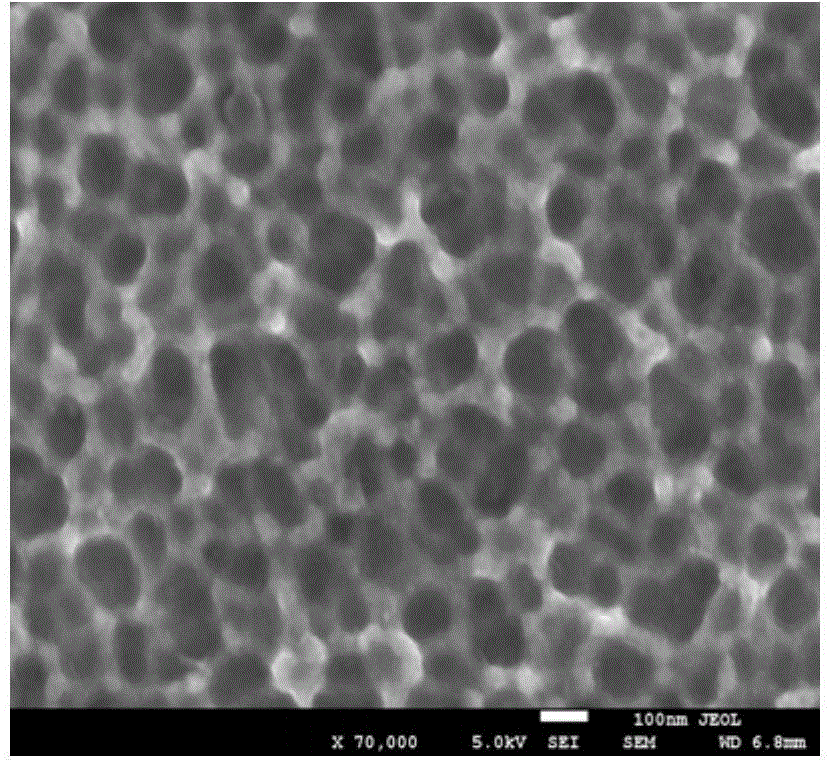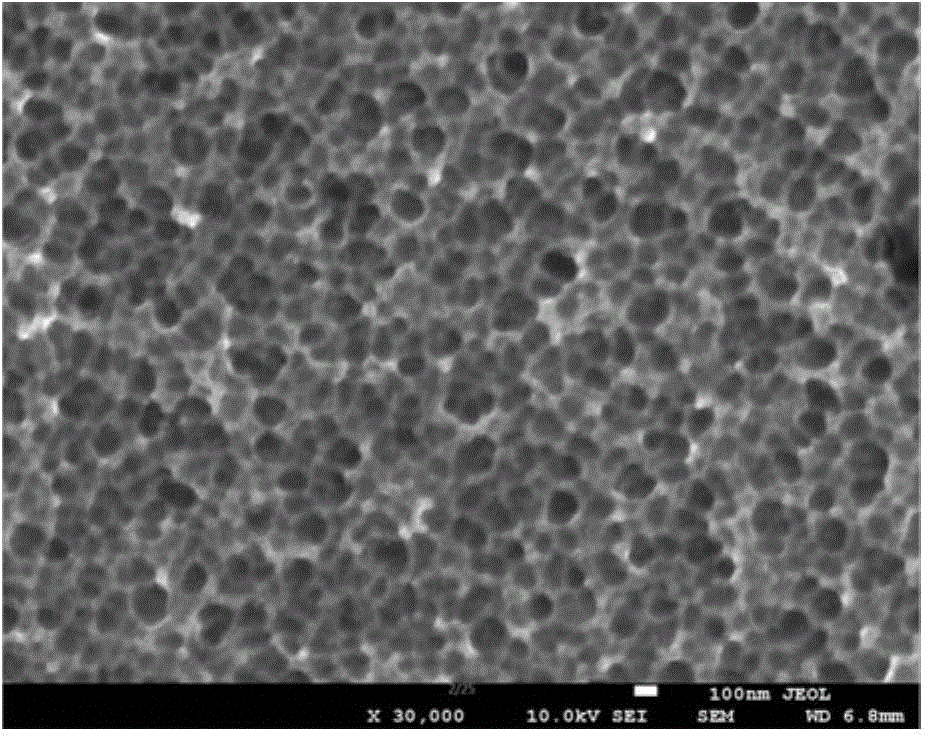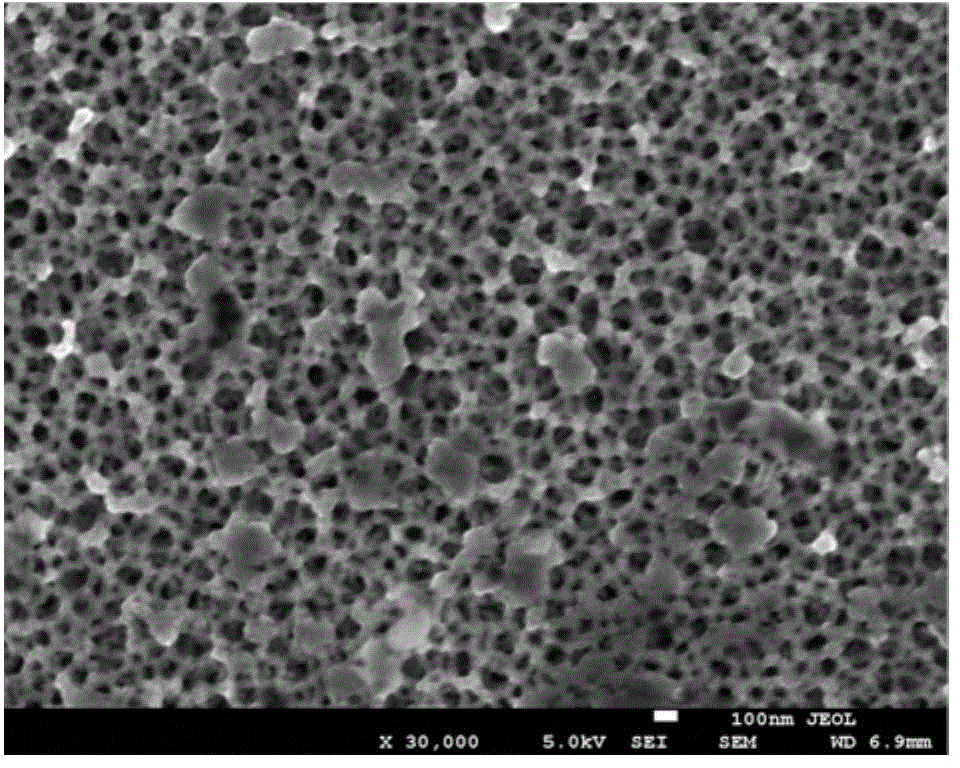Preparation method of NiTi shape memory alloy with porous surface
A memory alloy, surface porous technology, applied in the direction of surface reaction electrolytic coating, pharmaceutical formula, anodic oxidation, etc., can solve the problem of not belonging to the valve metal, achieve low Ni content, accelerate the bone healing process, and promote the effect of exchange
- Summary
- Abstract
- Description
- Claims
- Application Information
AI Technical Summary
Problems solved by technology
Method used
Image
Examples
Embodiment 1
[0035] The surface modification of medical NiTi shape memory alloy was carried out according to the following steps
[0036] Step 1: NiTi alloy surface pretreatment, followed by degreasing, SiC sandpaper grinding, mechanical polishing and ultrasonic cleaning;
[0037] Step 2: Anodizing treatment, put the NiTi alloy after ultrasonic cleaning into the electrolyte, use the NiTi alloy as the positive electrode, and the graphite plate as the negative electrode, and control the temperature of the electrolyte to 30°C±5°C, using a DC stabilized power supply, in Anodizing treatment under the condition of constant voltage 35V for 90min; wherein, the electrolyte is a mixture of ammonium fluoride and ammonium sulfate with glycerol, ethylene glycol and deionized water as solvents, the concentrations of which are 0.3 mol / liter and 0.2 mol / L;
[0038] Step 3: Rinse with deionized water and then dry naturally to obtain a NiTi shape memory alloy with interconnected surface and porous surface ...
Embodiment 2
[0044] The surface modification of medical NiTi shape memory alloy was carried out according to the following steps
[0045] Step 1: NiTi alloy surface pretreatment, followed by degreasing, SiC sandpaper grinding, mechanical polishing and ultrasonic cleaning;
[0046]Step 2: Anodizing treatment, put the NiTi alloy after ultrasonic cleaning into the electrolyte, use the NiTi alloy as the positive electrode, and the graphite plate as the negative electrode, and control the temperature of the electrolyte to 30°C±5°C, using a DC stabilized power supply, in Anodizing treatment under the condition of constant voltage 40V for 90min; wherein, the electrolyte is a mixture of ammonium fluoride and ammonium sulfate with glycerol, ethylene glycol and deionized water as solvents, and the concentrations are 0.2 mol / liter and 0.2 mol / L;
[0047] Step 3: Rinse with deionized water and then dry naturally to obtain a NiTi shape memory alloy with interconnected surface and porous surface modifi...
Embodiment 3
[0051] The surface modification of medical NiTi shape memory alloy was carried out according to the following steps
[0052] Step 1: NiTi alloy surface pretreatment, followed by degreasing, SiC sandpaper grinding, mechanical polishing and ultrasonic cleaning;
[0053] Step 2: Anodizing treatment, put the NiTi alloy after ultrasonic cleaning into the electrolyte, use the NiTi alloy as the positive electrode, and the graphite plate as the negative electrode, and control the temperature of the electrolyte to 30°C±5°C, using a DC stabilized power supply, in Anodizing treatment under the condition of constant voltage 50V for 90 minutes; wherein, the electrolyte is a mixture of ammonium fluoride and ammonium sulfate prepared with glycerol, ethylene glycol and deionized water as solvents, and the concentrations are 0.1 mol / liter respectively and 0.2 mol / L;
[0054] Step 3: Rinse with deionized water and then dry naturally to obtain a NiTi shape memory alloy with interconnected surfa...
PUM
| Property | Measurement | Unit |
|---|---|---|
| thickness | aaaaa | aaaaa |
| pore size | aaaaa | aaaaa |
| pore size | aaaaa | aaaaa |
Abstract
Description
Claims
Application Information
 Login to View More
Login to View More - R&D
- Intellectual Property
- Life Sciences
- Materials
- Tech Scout
- Unparalleled Data Quality
- Higher Quality Content
- 60% Fewer Hallucinations
Browse by: Latest US Patents, China's latest patents, Technical Efficacy Thesaurus, Application Domain, Technology Topic, Popular Technical Reports.
© 2025 PatSnap. All rights reserved.Legal|Privacy policy|Modern Slavery Act Transparency Statement|Sitemap|About US| Contact US: help@patsnap.com



